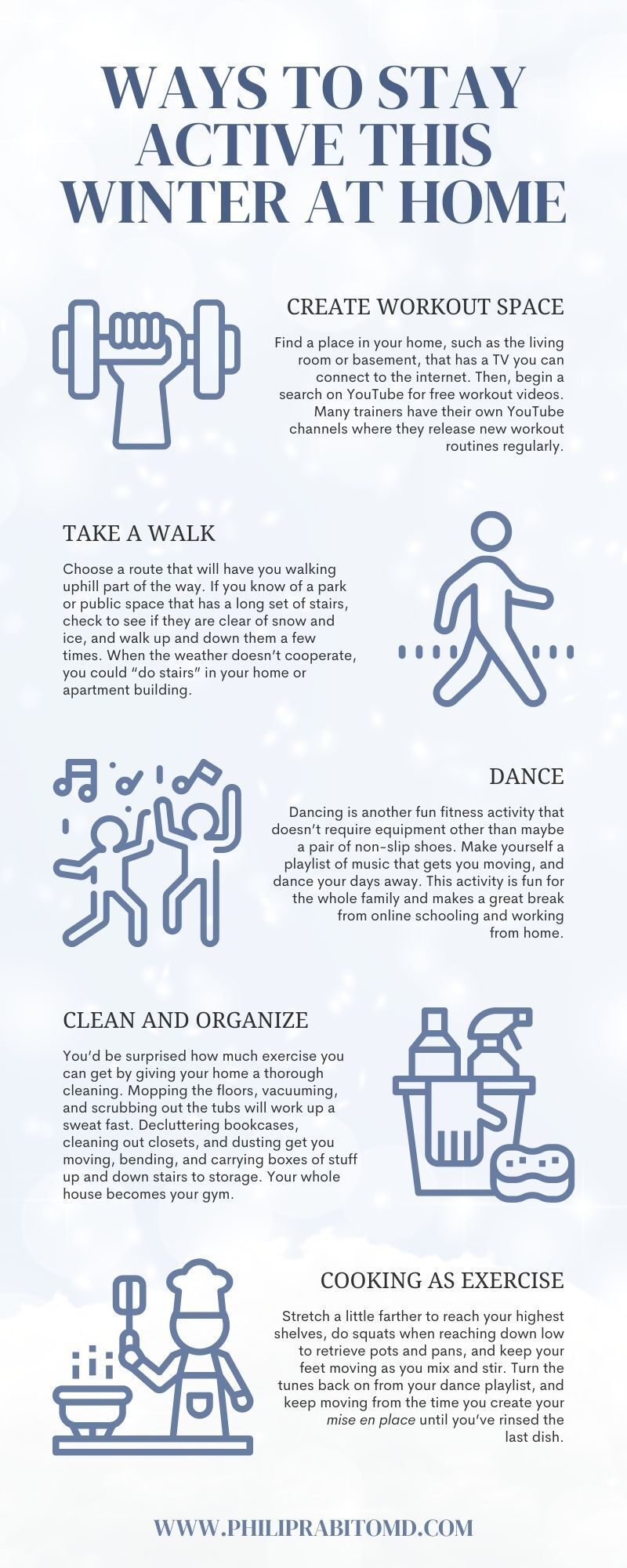It will be months before effective vaccines against COVID-19 will be available for distribution, so you’ll need a few ways to stay active this winter at home.

Although we see the light at the end of the tunnel in the form of effective vaccines against COVID-19, it will still be months before vaccines are available for widespread distribution. Surging cases and full ICUs in hospitals all over the world mean that social distancing and isolation are still necessary to stem the spread of the disease—in fact, it’s more important than ever as caseloads reach record highs not seen in the first wave of the COVID-19 pandemic.
On top of that, the approach of the coldest months of the year will see more people staying indoors. We now know that the coronavirus that causes COVID-19 spreads through the air. Airborne droplets carrying the virus can travel farther than previously thought and recirculate through indoor ventilation systems. This means people should stay home as much as possible, interacting only with the people who live in the same household.
We also know that exercise, while always essential to health, can help boost immunity. So as the season changes and you spend more time indoors, take advantage of some of these ways to stay active this winter at home. Be sure to check with your doctor in advance about the kind of exercise that’s OK for you.
Create Workout Space
You don’t need a lot of fancy equipment to stay fit at home. A set of dumbbells of various weights and a mat can provide several ways to stay active working out at home this winter. You can easily store these out of sight when not in use.
Find a place in your home, such as the living room or basement, that has a TV you can connect to the internet. Then, begin a search on YouTube for free workout videos. Many trainers have their own YouTube channels where they release new workout routines regularly.
Some fitness coaches offer subscription services with defined fitness programs for you to follow. These progressive programs build your stamina and strength and contribute to cardiovascular health.
Exercise also helps regulate blood glucose, using up the energy released into the bloodstream when the hormone cortisol signals the liver to send glucose out to be taken up by blood cells and delivered to muscles.
The pandemic has been tragic for far too many people and stressful for everyone. Anxiety about when we will finally be able to get back to something resembling normalcy has caused lots of people stuck at home to overeat. Even without overeating, lack of sleep from worries can cause weight gain by causing imbalances in insulin levels, creating insulin resistance that causes blood sugar levels to rise. Exercise releases endorphins, the feel-good neurotransmitter that boosts your mood and relieves stress.
Take a Walk
Winter can be beautiful if you’re wearing the proper attire. If the four walls of your home feel like they’re closing in on you, bundle up and take a walk on the next bright, sunny winter day. Fresh, outdoor air is healthier than stale, indoor air. The breezes and open spaces of parks and preserves are safer in terms of transmitting or catching COVID-19, too, as long as you maintain social distance.
Choose a route that will have you walking uphill part of the way. If you know of a park or public space that has a long set of stairs, check to see if they are clear of snow and ice, and walk up and down them a few times. When the weather doesn’t cooperate, you could “do stairs” in your home or apartment building. Just make sure you don’t get locked in the stairwell!
Dig out your old ice skates and get them sharpened. Find a less-crowded time to go to an outdoor rink, and glide the morning away. Take a mask with you in case the crowd turns out to be larger than anticipated, and try to keep your distance.
Dance
Dancing is another fun fitness activity that doesn’t require equipment other than maybe a pair of non-slip shoes. Make yourself a playlist of music that gets you moving, and dance your days away. This activity is fun for the whole family and makes a great break from online schooling and working from home.
The artistically inclined can use a sturdy chair as a barre and find a ballet workout to follow online. Ballet involves the entire body. The movements, including pliés, battements, and port de bras, will work arms and legs, and the balance and posture required will give your core a thorough workout.
Clean and Organize
Home stores saw surges in sales during lockdowns. When you spend all your time at home, you start to notice things that need repair, replacement, or rearranging.
You’d be surprised how much exercise you can get by giving your home a thorough cleaning. Mopping the floors, vacuuming, and scrubbing out the tubs will work up a sweat fast.
Decluttering bookcases, cleaning out closets, and dusting get you moving, bending, and carrying boxes of stuff up and down stairs to storage. Your whole house becomes your gym.
Cooking as Exercise
Cooking keeps you on your feet and moving around the kitchen. Stretch a little farther to reach your highest shelves, do squats when reaching down low to retrieve pots and pans, and keep your feet moving as you mix and stir. Turn the tunes back on from your dance playlist, and keep moving from the time you create your mise en place until you’ve rinsed the last dish.
As always, consult your doctor before beginning any exercise regime. You may have pre-existing or undiscovered health conditions that might preclude you from high-impact workouts involving jumping (tough on the joints) or extreme workouts that stress the heart too much. Work together with your doctor to identify the forms of exercise that will enhance your health without causing harm to your system.
In the early months of the pandemic—as two weeks extended into four, then six, and months more—many people took refuge in comfort foods and put on weight. A side effect of staying active this winter at home is likely to be weight loss. If your doctor is concerned about your weight, you might benefit from seeing an endocrinologist. These specialists can determine if hormonal imbalances play a role in your struggle to maintain a healthy weight. Dr. Philip Rabito is consistently recognized as one of the best endocrinologists in New York City. Dr. Rabito sees patients in Manhattan and other boroughs of the city.


